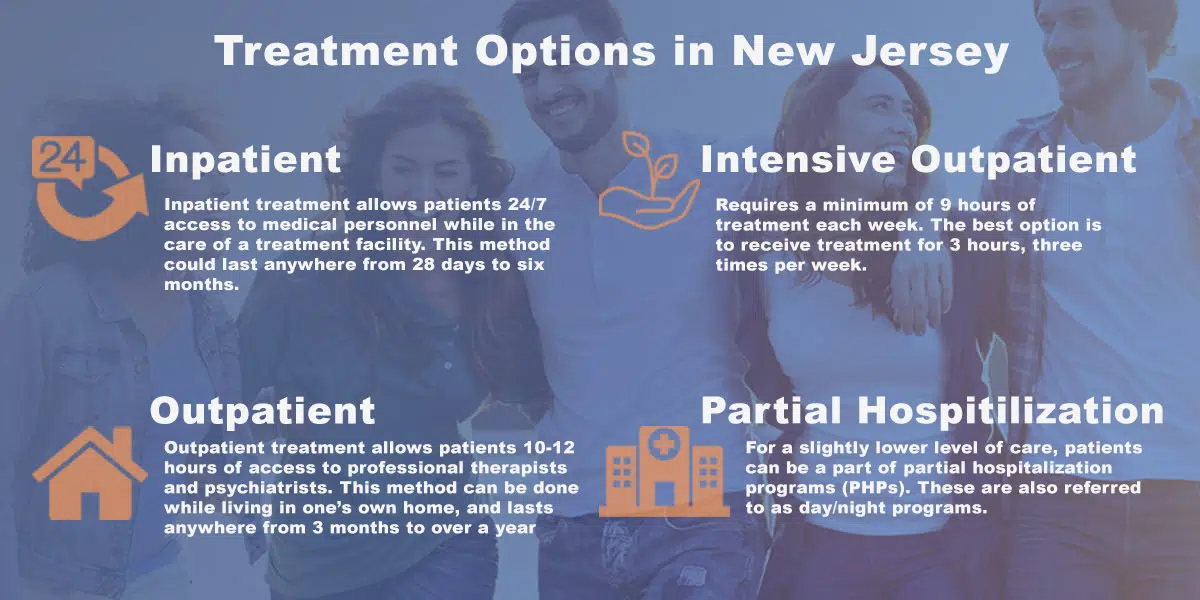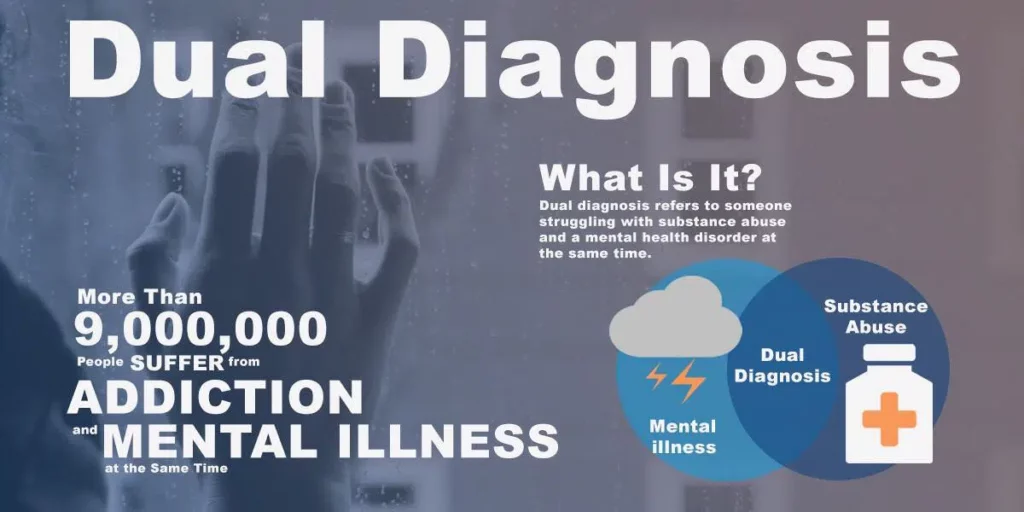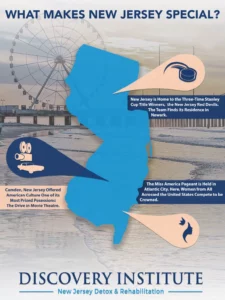Drug, Alcohol, and Treatment Resources in New Jersey
New Jersey Drug and Alcohol Treatment Resources
Drug and alcohol addiction can often feel like a lone battle; it is one of the most isolating circumstances that life has to offer. However, no matter how hopeless things may seem, there are avenues to help those who struggle to overcome their illness.
Substance Abuse in New Jersey
Of those who struggle with substance abuse in New Jersey, 22% are unemployed and 7% are homeless. What’s more alarming is that nearly 2,000 students suffer from substance abuse as well. Not only that, but 83% of those who struggle are single/divorced while 12% are married.
That being said, there is not just one type of person who suffers from addiction.
What’s most shocking is that New Jersey has a heroin overdose rate that is three times higher than the national average. Also, in 2017 alone, there were over 82,000 substance abuse treatment admissions in the state of New Jersey. There has also been a staggering 700% increase in admission to drug programs over the last decade. 14,000 people have died from a drug overdose in New Jersey since 2004.
If you feel like your addiction goes beyond drugs and alcohol, you’re probably right. Drug addiction is often associated with other mental health issues. Research has also shown a high correlation between drug abuse and anxiety disorders.
Substance abuse can creep up on anybody, and it’s more common than some people would be led to believe. In fact, this is why some addicts refuse to admit that there is a problem; it alienates them. It is imperative that these people feel and know that they are not alone. It’s also important for these individuals to be met with grace and understanding. The last thing anybody wants is to feel isolated, and substance abuse has a way of doing just that.
Meeting somebody with grace and understanding, however, is not the end all be all of someone’s path to stability. In fact, it is just the beginning. In order for someone to recover completely, it is imperative that they have all of the tools they need at their disposal. This is why it’s good to familiarize oneself with all of the different treatment options that are available.
Substance Abuse Treatment Options
Substance abuse treatment options and resources in New Jersey include the following:
- Inpatient Treatment
- Outpatient Treatment
- Intensive Outpatient Treatment
- Drug and Alcohol Detox
- Alcoholics Anonymous
- Narcotics Anonymous
- Dialectical Behavioral Therapy
- Cognitive Behavioral Therapy
- Individual Therapy
- Family Therapy
- Group Therapy
- Holistic Treatment
If you’re wondering whether there is a drug and alcohol treatment center near you, the answer is yes! There are actually 510 rehab centers in the state of New Jersey, which means you’ll have no trouble finding one that meets your specific needs.
Throughout New Jersey, you’ll find all types of treatment centers. There will be inpatient facilities, centers that offer medically-assisted detoxing, facilities that offer recovery programs from specific substances such as opiates or alcohol, and much more.
The best treatment center will offer several different programs to meet your needs. You should look for a facility with inpatient treatment, intensive outpatient treatment, detox, holistic approaches, counseling, and relapse prevention.
The only thing more difficult than healing from substance abuse is finding the right kind of treatment to meet the needs of an individual. Since there are so many different options, choosing one can be overwhelming. But, here at the Discovery Institute of New Jersey, we have many different options available at your disposal. We are committed to making this process an effortless one for you.

Inpatient Treatment
Inpatient treatment is a recovery method used in more severe cases of addiction. It could last anywhere between 28 days and six months. Throughout the duration of this program, patients stay in the care of treatment facilities and have 24/7 access to medical professionals. This option also allows them daily access to professional therapists and psychologists.
Outpatient Treatment
Used to treat milder cases of addiction, outpatient treatment allows patients 10-12 hours of weekly access to professional therapists and psychiatrists while living in the comfort of their own homes and daily routines. This program is longer in length than that of inpatient treatment, lasting anywhere from six months to over a year.
Intensive Outpatient Treatment
Intensive outpatient treatment is for those who finish inpatient treatment and still require immersive treatment as they adjust to life outside of the walls of a care facility. This treatment offers frequent and consistent therapeutic care while allowing patients to adjust to life in the world outside of rehab.
Detox Treatment
Drug cravings are often difficult to satisfy. In a controlled environment, detox treatment uses medicine to help someone be weaned off drugs comfortably. The ultimate purpose of this treatment option is to control the symptoms of withdrawal through medically assisted treatment.
Therapy Options While in Treatment in New Jersey
Therapy is a significant part of recovery. It has been known to go the extra mile in helping those who are struggling from substance abuse. Therapy in rehab treatment isn’t limited to any one technique. There are different kinds of therapy that caters to the needs of every unique individual.
Dialectical Behavioral Therapy
Dialectical Behavioral Therapy (DBT) is a therapeutic technique that helps patients overcome mental illnesses. It is often used to treat the following:
- Borderline Personality Disorder
- Depression
- Substance Abuse
- PTSD
Some of the methods paired with DBT include skills training, individualized therapy, phone coaching, and team consultation.
DBT is a type of Cognitive Behavioral Therapy. It is used to treat patients who have borderline personality disorder, and other illnesses as well. The purpose of DBT is to identify a patient’s psychological thought processes.
Cognitive Behavioral Therapy
Cognitive behavioral therapy is a technique in which therapists and psychologists alike evaluate a person’s psychological thought process in order to determine the way in which they see the world around them. This is done with the intent of understanding why these people act the way they do, and thus improving their behavior providing them with coping strategies in order to move past their illness.
Individual Therapy
Therapy’s purpose is to help patients evaluate their past as it relates to substance abuse. This particular treatment method allows them to reshape their perspective in a way that impacts their recovery journey positively. Improving their coping mechanisms is the ultimate goal, and that is done by helping them develop in the area of self-control.
Individual therapy provides patients with a safe space to talk about their internal struggles, even if it does not relate directly to substance abuse. This is done because there are often external factors that influence someone’s struggle with addiction. Individual therapy helps people discuss topics that may have influenced their addiction freely, without the stigma of guilt and shame.
As far as its frequency is concerned, individualized therapy can be scheduled weekly or several times a week. It is also worth mentioning that patients are assigned a therapist whom they will spend all of their individual therapy sessions with.
Group Therapy
Group therapy is used to help patients address their addiction amongst their peers. This provides them with a safe environment in which others can understand their thought processes. This sort of community helps them feel supported and impacts their recovery in a positive way.
Each kind of group therapy is used to address every area of addiction from physical health to mental health. The purpose is to set patients up with an unshakable support system so that they can be well-adjusted to life outside of treatment. This treatment method can be used to teach a variety of coping and emotional processing skills.
During these group therapy sessions, patients discuss anything that relates to recovery or addiction in order that they may process the impact that their substance abuse has had on them. These groups are overseen by professional therapists who specialize in group dynamics and communication skills.
Family Therapy
One of the worst parts about addiction is that it doesn’t only affect those abusing the substance, but it also affects their families or loved ones. Family therapy is imperative to healing the dynamic between loved ones whose relationships have been severed by drug or alcohol addiction.
Discovery Institute in New Jersey is committed to helping those who struggle with substance abuse and their families in order that they might recover and pursue a life of stability. We do this by encouraging family members and loved ones to take part in the recovery process as soon as they walk through our doors. This is done because they are the ones who will live with them the longest, so it is imperative that they are involved with this process.
Holistic Treatment
Holistic treatment aims to treat a patient’s mind, body, and soul with natural recovery methods. This particular method of treatment has been known to be effective in helping those who suffer from addiction in a natural way that brings every part of their being together.
Focusing on one’s identity and practicing being present in the moment often seems counter-intuitive in this day-in-age. With everybody so caught up in their own worlds, it is often difficult to connect to the world around them. However, doing so could make all the difference in someone’s recovery journey.
At Discovery, we utilize holistic care by implementing medical, physical and spiritual practices for our patients. Some of these methods include massage therapy, yoga, meditation, nutritional therapy, and herbal medicines. These methods of treatment have been known to be rather successful.
CONTACT US
Find out how we can help
Our compassionate counselors are standing by to answer any questions you may have. After helping thousands of people over the last 50 years, we have the resources to help you and your family and all your individual needs.
Treatment for Young Adults in New Jersey
Young adults want nothing more than to find a place where they belong. It’s because of this that drug use begins in many of them. One of the most dangerous things about this is that it could be an impetus for long-term addiction.
Isolation is uncomfortable, and for a teenager who is in their most vulnerable stage of life, being alone is terrifying. Most of all, even though they may not admit it, they have a deep desire for security. This is why it is so important to provide them with a support system that they can relate to and feel empowered by. This means all the difference in their recovery journey.
At Discovery Institute in New Jersey, we are prepared to provide treatment unique to each individual that walks through our doors. We are committed to giving young people care that helps them combat their addiction as it relates to the stage of life they’re in. We do this by providing specialized treatment that addresses every area of their addiction and caters to their every emotional and physical need.
Treatment for Seniors in New Jersey
There is no one-size-fits-all addiction treatment option; seniors are no exception to this rule. Whatever capacity they deal with their substance abuse, rehab for seniors comes with its own challenges. One problem that presents itself more frequently in seniors is their susceptibility to different handicaps and ailments.
According to a recent study, the number of seniors between 50-65 years of age who struggle with illicit drug use has doubled from 2002-2012. Thus, the perception that seniors don’t struggle with substance abuse because they are older and wiser is largely false.
At Discovery Institute, we specialize in meeting each of our client’s individual needs. In fact, our admissions process involves thorough medical exams overseen by a professional medical staff. The purpose of this process is to assess the mental, emotional, and physical well-being of potential senior patients. This allows us to create a treatment plan that addresses their unique, individual needs.
Dual Diagnosis Treatment
 Dual diagnosis refers to someone who struggles with substance abuse and mental health disorder simultaneously. However, it is important to note that while they can both occur simultaneously, they’re not sequential. In other words, just because one occurs, it does not mean the other will follow.
Dual diagnosis refers to someone who struggles with substance abuse and mental health disorder simultaneously. However, it is important to note that while they can both occur simultaneously, they’re not sequential. In other words, just because one occurs, it does not mean the other will follow.
If you feel like your addiction goes beyond drugs and alcohol, you’re probably right. Drug addiction is often associated with other mental health issues. Research has also shown a high correlation between drug abuse and anxiety disorders.
To be more clear, substance abuse could have very little to do with one’s depression. The main idea is that they both happen to be present at the same time. For example, a person could have been suffering from substance abuse long before depression made itself known.
According to some studies, there are more people who suffer from co-occurring disorders than those who live in the state of Georgia. That’s more than nine million people who suffered from addiction and mental illness at the same time.
At Discovery in New Jersey, there is treatment available for those who have co-occurring disorders. Our ultimate desire is to help those who suffer from co-occurring disorders by dually diagnosing and directing them towards a place of stability and sobriety. It’s natural to feel isolated in times like these, but nobody is alone in their struggle at Discovery. Every patient who walks through our doors can rest assured that they are among people who care for them and want to see them flourish in their recovery journey.
Ongoing Recovery in New Jersey
Recovery options don’t just stop at the various programs listed above. In fact, there are support groups that meet in rehab that bring more depth to the level of care that is offered. Some of these include Alcoholics Anonymous, Narcotics Anonymous, SMART recovery options and even LGBTQ recovery.
Alcoholics Anonymous and Narcotics Anonymous in New Jersey
Alcoholics and Narcotics Anonymous are organizations in which support groups are the therapeutic model, typically utilizing a twelve-step program. These have a positive impact on treating all kinds of substance abuse. The purpose of these programs is to help individuals to mend their broken relationships with others and help them overcome their addiction in the process.
SMART Recovery in New Jersey
SMART Recovery (Self Management and Recovery Training) is a four-step program in which people who wish to practice abstinence from drugs can receive help from others by doing the following:
- Building and maintaining motivation
- Learning to cope with urges
- Managing emotions, thoughts, and behaviors
- Finding a life of balance
SMART Recovery aims to help people become self-sufficient and disciplined when it comes to drug use. Meetings usually last an hour and a half and are moderated by trained professionals. Those who are moderating the conversations usually have topics and points of discussion prepared. SMART groups work through one of the four program points in each meeting and use some of the program’s techniques which include the following:
- Change plan worksheet
- Decision-making worksheet
- Cost/benefit analysis
- Tools for urge coping
- Tools for emotional upsets
- DISARM (Destructive Images and Self-talk Awareness & Refusal Method)
- Role-playing and Rehearsing
- Unconditional Self-Acceptance
Apps for Recovery
There are more than just formal meeting places to help those who struggle with substance abuse get the help they need. Today, technology has advanced in such a way that much of it is used to make life more convenient. In this case, Substance abuse is no exception. Some apps that have been created to help combat substance abuse include the following:
- Sober Time
- Coach.me
- NOMO
- Sober Grid
- rTribe
All of these apps for recovery were developed to help people in the recovery community stay accountable anonymously. From online community support to sobriety calendars, these apps have proven themselves successful. Some of these apps even send daily motivational messages. For people who embrace the convenience of modern-day technology, this could be a nice way to increase the likelihood of achieving sobriety.
How to Choose The Right Treatment Facility in New Jersey
To get a good idea of what treatment center is best for you, it’s important to look at online reviews and testimonials. You’ll also want to take a look at the programs they offer. Most importantly, visit a potential facility and ask questions. If you’re doing inpatient rehab, you’ll want to be somewhere with caring professionals so you feel safe and taken care of.
About the State of New Jersey
The state of New Jersey’s origins, as it pertains to the United States, dates back all the way to 1660. It was then that the settlement of Bergen came into being. Four years later, the British took control of the land and it became one of their many expansive colonies. In fact, the beloved state was named after the isle of Jersey in the English channel.
Fast forward a few hundred years later and this land is now one of the United States of America. New Jersey is known for both its past and current state of being, and there are many things that make it special.
What Makes New Jersey Special
 There are many aspects of the state of New Jersey that make it special. It is home to entertainment legends such as Jack Nicholson, Bon Jovi, Bruce Springston, Shaquille O’Neal and many more. The state is also known for making its legends such as any woman who has ever won Miss America; New Jersey is the home of the Miss America pageant.
There are many aspects of the state of New Jersey that make it special. It is home to entertainment legends such as Jack Nicholson, Bon Jovi, Bruce Springston, Shaquille O’Neal and many more. The state is also known for making its legends such as any woman who has ever won Miss America; New Jersey is the home of the Miss America pageant.
In addition to all of its entertainment accolades is what the state does for the sports world. New Jersey is home to professional football, soccer, and hockey teams. The New York Jets and Giants, because of New Jersey’s close proximity to the state, finds its stadium in East Rutherford. Both of these teams have brought Super Bowl victories back home with them.
The New Jersey Red Devils are also a very popular franchise especially given the fact that hockey is immensely popular on the north-side of North America. The Red Devils have won three NHL titles, bringing the Stanley Cup to the die-hard fans of New Jersey.
Not only is New Jersey a great home for sports, but it also gave birth to the infamous drive-in movie theatre. Opening the theatre on June 6, 1933, Richard Hollingshead wanted to provide consumers with a movie-going experience that would have no match: watching a movie on the big screen in the comfort of one’s own motor vehicle. He ultimately wanted to make the movie-going experience easier, and because of it, drive-ins have become a popular culture icon.
Finally, one of the most interesting things about the great state of New Jersey is the fact that it is against the law to pump your own gas. This law dates back to 1949 when the state of New Jersey passed a law called the Retail Gasoline Dispensing Safety Act, in which it is explained that consumers pumping their own gas is an unnecessary safety hazard. This provided new jobs to those who previously could not find work. Plus, it’s nice to not have to do things yourself every once and awhile.
New Jersey Demographics
Sitting on the edge of the eastern United States, the state of New Jersey has a population that sits somewhere close to 9 million people, with the exact 2019 estimate being 8.92 million. According to the 2010 census, there were 8,791,894 people living in New Jersey. That would bring New Jersey’s growth percentage to 0.41% in the last decade.
As far as the cities of New Jersey are concerned, Newark is the largest, ringing in 281,944 people. The majority of the population within the state reside in the counties that surround the Eastern Jersey Shore, New York City, and Philadelphia. The remaining counties have much lower population density.
Diversity
 According to one population estimate made in 2018, the racial composition of New Jersey is as follows:
According to one population estimate made in 2018, the racial composition of New Jersey is as follows:
- White – 72%
- Hispanic – 20%
- Black or African American – 15%
- Asian – 10%
With the second-largest Jewish and Muslim populations in the U.S, the second-largest Cuban population, and a vast number of Hispanics, Arabs, and African-Americans, New Jersey could be considered a vastly diverse area. In terms of religion, New Jersey is made up of the following:
- Christians – 67%
- Non-religious – 19%
- Jewish – 6%
- Muslim – 3%
- Hindu – 3%
The United States is a pretty big hub for diversity. There are many different cultures represented largely due to the fact that most cultures can come to seek opportunities that they otherwise would not have been able to. However, there are also people who weren’t able to pursue opportunity and wound up with something they never asked for: Substance Use Disorder.
Get Help from Discovery New Jersey Today
Living with substance abuse is difficult, especially if you’re not sure what your surrounding area provides you with. There are plenty of options in New Jersey to fulfill your treatment needs, including Discovery Institute New Jersey. If you are interested in receiving help from Discovery, you can contact us here.
https://www.nj.com/news/2015/05/a_brief_history_of_why_you_cant_pump_your_own_gas.html
https://www.nj.com/news/2018/03/njs_most_popular_religions_ranked.html
https://www.census.gov/quickfacts/NJ
https://www.infoplease.com/us/comprehensive-census-data-state/demographic-statistics-222
https://www.state.nj.us/health/chs/hnj2020/documents/demog.pdf
https://www.drugabuse.gov/opioid-summaries-by-state/new-jersey-opioid-summary
https://www.nj.gov/humanservices/dmhas/publications/statistical/
Discover
Your Potential
Finding a life of happiness and sobriety is possible. You are not alone! All you need to do is take the first step.



